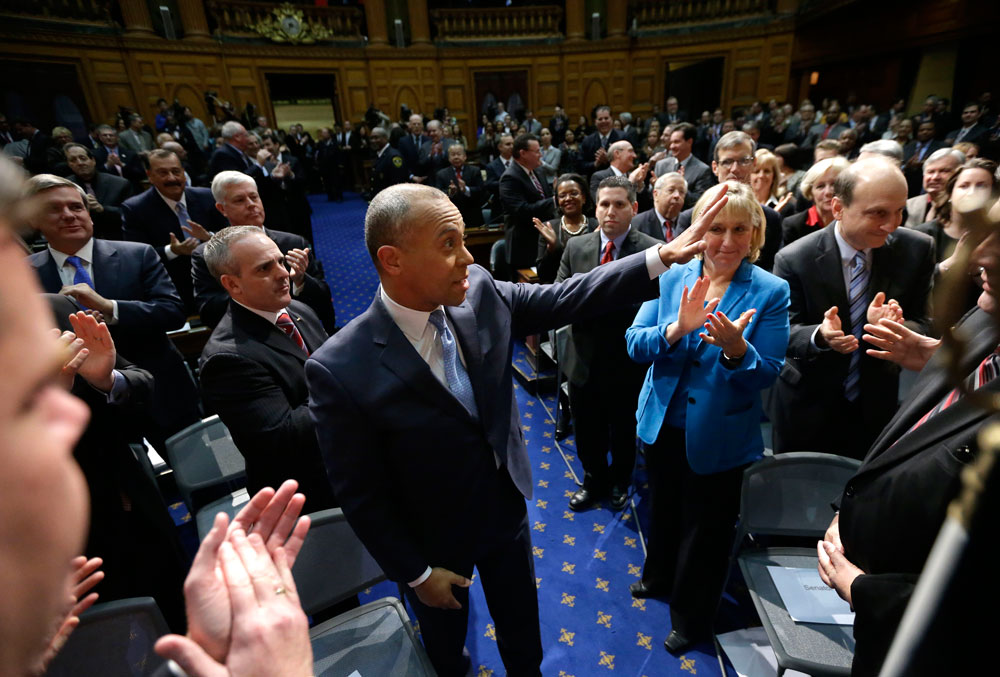
Most Americans and nearly all American politicians speak only the language of individuality, the unbridled market, interests, ambition. Deval Patrick speaks that language too but almost uniquely in American politics he speaks America’s second language: the language of Biblical religion.
The language most of us regularly converse in was given life and endorsed in The Federalist Papers. In the Papers “Publius” (primarily James Madison and Alexander Hamilton) warned of the vicious traits of human nature and described a system of government that would be so constructed as to not be dependent on virtue for its sound operation. “Ambition must be made to counteract ambition;” “If men were angels no government would be necessary;” “the most common and durable source of factions has been the various and unequal distribution of property.” It is the language of The Federalist, of commerce, transaction, and adjustment that is the public language of American politics and government.
The second language, the one of community and the moral imperative of care for others represented in John Winthrop’s Model of Christian Charity, supported by some of the anti-Federalists, by Alexis de Tocqueville and Wilson Carey McWilliams, is a language not often spoken today. Tocqueville saw religion’s value in a democracy in its tendency to turn each man’s gaze from his own selfish affairs to the needs of his community. The second language does not lightly dismiss the idea of a virtuous citizenry.
At the Democratic state convention of 2012 Governor Patrick recounted one of his most emblematic stories, of the rejuvenation of the once desperate Orchard Garden School. Speaking of the difficult lives of the first graders there the governor stated “But those Orchard’s Garden kids should not be left on their own. Those children are our children; America’s children. Yours and mine too…. For this country to rise, they must rise; they must rise. And we have a common stake in that.” If the words were not specifically biblical they were resonant of Winthrop’s Model of Christian Charity, of the responsibility the privileged have for their less fortunate brethren: “that every man might have need of others, and from hence they might be all knit more nearly together in the bonds of brotherly affection. From hence it appears plainly that no man is made more honorable than another or more wealthy etc., out of any particular and singular respect to himself, but for the glory of his Creator and the common good of the creature, man.”
A more recent occasion came when Governor Patrick announced that he would offer comfort in the state for some of the undocumented Central American children pouring into America last summer. Here some of his reasoning was explicitly religious. ““My faith teaches that if a stranger dwells with you in your land you shall not mistreat him, but rather love him as yourself. For you were strangers in the land of Egypt. We are admonished to take in the stranger, for inasmuch as you did it to one of the least of these, Christ tells us, you did it to me.” His remarks were a reminder of Winthrop’s prayer in The Model: “If thy brother be in want and thou canst help him, thou needs not make doubt of what thou shouldst do; if thou lovest God thou must help him.”
To many of us religion in politics has come to mean the imposition of another’s faith on our lives and brought the wish that religion be banished from the public square. But moral questions will never go away and religious language is the most long standing and meaningful way for us to manage those conversations. A philosophical outlook can be a powerful means to discuss morality but our history is braced in religious thought. America’s second language is much more muted than our first but it is needed as a counterpoint and for moral criticism.
Part of Governor Patrick’s talent is that he projects the careful humility that recognizes that “My faith teaches me” demands more to bring many of us along to his point of view. He lacks the moralistic outlook that pushes away even those who may agree with him. His “faith” is not grounded in regulating what each individual is or should be doing in their intimate lives but in the community that he seeks.
We don’t see the second language from the governor much but when needed, it’s there. His choice of when to speak that language -- and the uses he may make of it in the future -- are among the fascinations of following this intriguing public servant.

